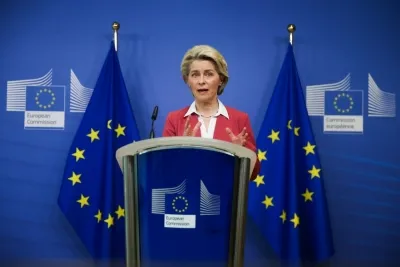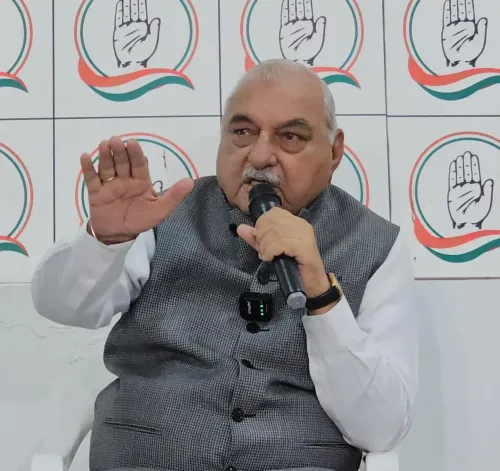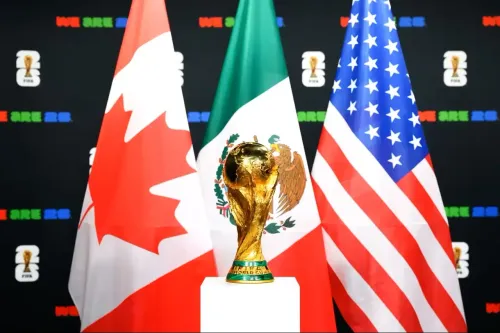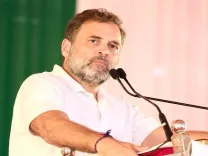How Will the EU React to Trump's Tariff Threat?

Synopsis
Key Takeaways
- Trump's 30% tariffs on EU exports have sparked significant outrage.
- EU leaders are calling for a strong, united response.
- Proposed tariffs could disrupt transatlantic supply chains.
- The automotive sector is particularly vulnerable to these tariffs.
- EU officials emphasize the need for proportionate countermeasures.
Brussels, July 13 (NationPress) The unexpected declaration by US President Donald Trump regarding extensive 30 percent tariffs on exports from the European Union (EU) has ignited a strong backlash throughout the bloc. Officials and industry leaders are calling for a decisive and united reaction as trade discussions continue.
The proposed tariffs, scheduled to commence on August 1, specifically target EU imports and were rationalized by Trump as a necessary adjustment to a trade relationship that is "far from reciprocal".
European Commission President Ursula von der Leyen cautioned on Saturday that the tariffs would "disrupt essential transatlantic supply chains, adversely affecting businesses, consumers, and patients on both sides of the Atlantic."
While reaffirming the EU's dedication to a negotiated resolution, she asserted that the bloc "will take all necessary measures to protect EU interests, including implementing proportionate countermeasures if necessary."
European lawmakers and national leaders expressed escalating frustration, with many advocating for immediate retaliatory actions, as reported by Xinhua news agency.
Bernd Lange, chair of the European Parliament's international trade committee, described the US letter as "both impertinent and a slap in the face" following weeks of negotiations.
He urged the EU to initiate retaliatory actions by Monday as planned, declaring that "the waiting period is over."
European Council President Antonio Costa remarked that the tariffs would lead to inflation, increase uncertainty, and hinder growth. "The EU stands firm, united, and ready to defend our interests," he emphasized, calling for progress toward a "fair agreement" with Washington.
French President Emmanuel Macron voiced his "strong disapproval" of the US decision, asserting that the EU must accelerate its preparation of "credible countermeasures" using all available tools, including anti-coercion measures, should talks fail.
Swedish Prime Minister Ulf Kristersson condemned the action as a "unilateral escalation," stating that the EU is poised to respond with robust countermeasures if necessary.
"Everyone suffers from an escalated trade conflict, and it will be US consumers who bear the brunt of the costs," he cautioned.
Czech Prime Minister Petr Fiala criticized the US tariffs for their potential adverse effects on transatlantic trade, advocating for "unity and determination" to safeguard the EU's interests.
European industries have raised alarms regarding the repercussions, especially in sectors closely tied to the US market.
Germany's principal industry lobby group, the BDI, labeled the US action as "an alarm signal," warning that it could disrupt the recovery and stifle innovation across both sides of the Atlantic.
"Utilizing tariffs as a method of political pressure results in increased costs, jeopardizes employment, and undermines international competitiveness in both Europe and the United States," stated Wolfgang Niedermark, a senior BDI executive.
Isabel Schnabel, a member of the European Central Bank board, indicated that the tariffs might lead to medium-term inflation and supply chain disruptions.
The automotive industry, which is already heavily integrated with both the EU and US, is starting to feel the impact.
Slovakia, a leading car-exporting nation in Europe, reported a significant reduction in orders for the upcoming third quarter. Economy Minister Denisa Sakova noted that relocating production to the US was impractical in the short term and emphasized that the damage had already commenced.
The German Association of the Automotive Industry (VDA) stated that the costs to manufacturers have already reached billions and continue to escalate daily.
"It is unfortunate that we face the threat of further escalation in the trade conflict," commented VDA President Hildegard Mueller.
"The costs for our companies are already in the billions, and this amount is increasing every day," she added, noting that suppliers are also substantially impacted by the import duties.
Emanuele Orsini, president of Confindustria, Italy's leading association for manufacturing and service companies, criticized the US approach as "unpleasant," while Paolo Mascarino, president of the Italian food and drink industry federation Federalimentare, stated that the tariffs "exceed any threshold of tolerability" and would result in significant declines in exports.
Dan O'Brien, chief economist at the Institute of International and European Affairs, characterized the US action as "provocative" and significantly increased the likelihood of a broader economic confrontation between the two economies.









